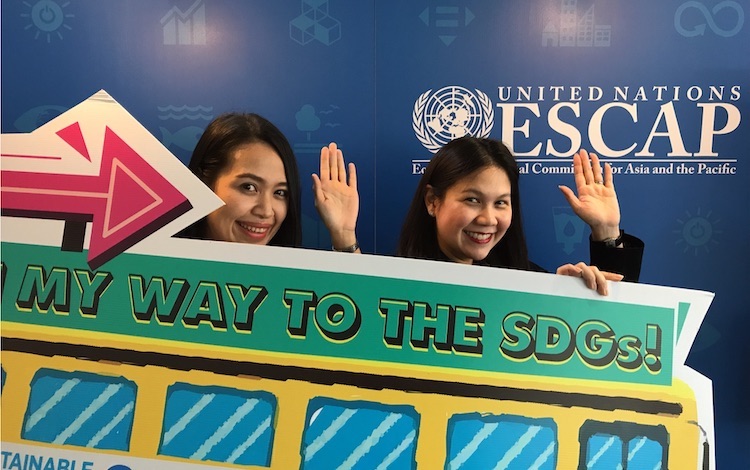By Devinder Kumar
NEW DELHI | BANGKOK (IDN) – The leaders and senior government officials, attending the 75th Session of the United Nations Economic and Social Commission for Asia and the Pacific (ESCAP) from May 27 to 31 in Bangkok, have called for efforts to advance equality and empowerment for over four billion people across the region and resolved to strengthen regional cooperation and partnerships towards achieving the 2030 Agenda for Sustainable Development.
The importance of this resolve is underlined by a new report published on May 28, which warns that if the region continues its current trajectory, it will not achieve any of the 17 Sustainable Development Goals (SDGs) by 2030. The report reveals that for more than half the SDGs, progress has stagnated or is heading in the “wrong direction”.
The situation is deteriorating when it comes to providing clean water and sanitation (SDG6), ensuring decent work and economic growth (SDG8) and supporting responsible consumption and production (SDG12), says the report
On the other hand, the region has made progress towards ending poverty (SDG1) and ensuring all have access to quality education and lifelong learning (SDG4). Measures are also underway to achieve affordable and clean energy (SDG7). Yet even where good progress has been made, states the report, it is too slow for these goals to be met by 2030.
Launching the SDG Progress Report 2019, United Nations Under-Secretary-General and Executive Secretary of ESCAP Armida Alisjahbana called for urgent action to reverse these negative trends. “I hope this report will contribute to targeting our efforts to accelerate progress towards all Goals and to strengthen the region’s commitment to improving the quality of data and statistics essential to measuring progress,” she said.
Several SDG targets related to the environment and natural resources are registering negative trends. Hazardous waste generation, the reduction in forest areas and the permanent water body extent are the three SDG indicators which are predicted to regress the most by 2030, compared to 2015.
Besides, the SDG Progress Report shows major differences in progress between the sub-regions of Asia and the Pacific which have recorded different successes and face different challenges. Each sub-region needs to reverse existing trends for at least three Goals, declares the report.
For example, East and North-East Asia is regressing in sustainable cities and communities (SDG11), climate action (SDG13) and life on land (SDG15). South-East Asia has moved backwards on SDG8, SDG13 and peace, justice and strong institutions (SDG16).
However, South and South-West Asia is moving in the “wrong direction” on SDG6, SDG12 and SDG13. Since 2000, there has been a decline on gender equality (SDG5), SDG8 and SDG11 in North and Central Asia. The Pacific sub-region has regressed on zero hunger (SDG2), SDG8, life below water (SDG14) and SDG16.
The lack of reliable data across all Goals and in all sub-regions is one of the Asia and the Pacific’s biggest challenges. Despite a significant increase in the availability of SDG indicators since 2017, data gaps remain for two thirds of the global SDG indicators. Nearly one-quarter of all SDG targets lacking evidence relate to the environment.
The report finds that there is scope for the region to make greater use of alternative data sources to complement traditional sources such as surveys and build a more accurate picture of progress towards the SDGs. It also calls for Asia and the Pacific to strengthen its global partnerships and means of implementing the 2030 Agenda for Sustainable Development (SDG17).
Progress towards this Goal is necessary to ensure the region has the means to finance, target and implement policy solutions. Failing to do so could jeopardise the achievement of all other Goals, warns the report.
Addressing the closing ceremony of the 75th Session, ESCAP Executive Secretary Alisjahbana said the decisions reached by member States on May 31 will help guide the work of the regional body. “The resolutions are firmly anchored in the 2030 Agenda and provide solid foundations on which to build upon. Many are aligned with the priorities I set out earlier this week and are essential to achieving a transformed and resilient society in Asia and the Pacific.”
She further emphasized, “To deliver against these priorities, and others set by the 2030 Agenda, our ability to work effectively at the sub-regional and regional level is critical. I am therefore pleased we were able to hold the first-ever dialogue with all major sub regional groups present in one session. I hope this will be a first step towards more systematically identifying common priorities to complement each other’s work, and to facilitate best practice exchange between sub-regions.”
Delegates endorsed a call to advance science, technology and innovation, as well as implementation of the Asia-Pacific Plan of Action on Space Applications for Sustainable Development (2018-2030), and the Asia-Pacific Information Superhighway.
Member States also agreed on the urgent need for regional cooperation to tackle air pollution challenges, and diversification of energy sources in this respect. Air pollution has increased considerably in recent years leading to a rise in premature deaths, threatening livelihoods and the sustainable development in the region, particularly in many cities with growing populations where air pollution is a major public health hazard.
Strengthening the development of national and local disaster risk reduction strategies was also underlined as a priority, through the Asia Regional Plan and Action Plan 2018-2020 for Implementation of the Sendai Framework for Disaster Risk Reduction. The Commission further committed to strengthen the link between national, regional and global follow-up and review to the 2030 Agenda, and to continue providing capacity building assistance to landlocked developing countries towards the smooth implementation of the six priorities of the Vienna Programme of Action. [IDN-InDepthNews – 31 May 2019]
Photo credit: UNESCAP
IDN is flagship agency of the International Press Syndicate.
facebook.com/IDN.GoingDeeper – twitter.com/InDepthNews
Send your comment: comment@indepthnews.colo.ba.be
Subscribe to IDN Newsletter: newsletter@indepthnews.colo.ba.be

